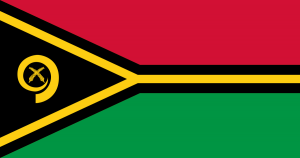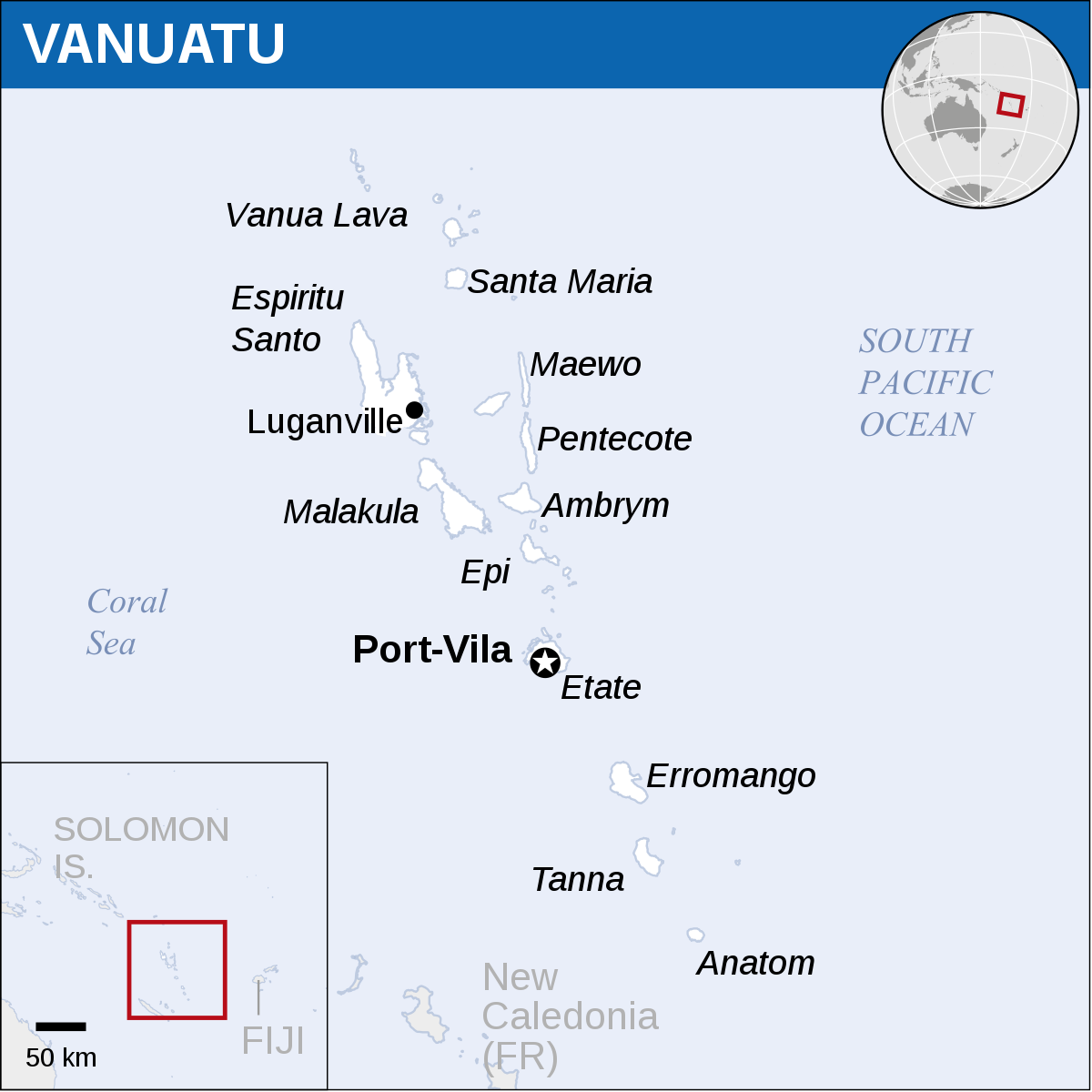
Vanuatu
International Disaster Response Law in the Pacific
Overview

Legal Preparedness for International Assistance Assessment
1. Does Vanuatu have a clear legal framework for disaster risk management which includes procedures relating to international disaster assistance?
The National Disaster Act 2000 sets out the circumstances in which a declaration of emergency may be made, which is essentially if the President, on the advice of the Council of Ministers is satisfied that the disaster constitutes a significant danger and exceeds the national response capacity. The Act provides that the National Disaster Operations Centre is to coordinate requests for aid. This is echoed by the National Disaster Plan 2010 which states that requests for international assistance will only be lodged when it becomes clear that the situation is beyond National capabilities.
As outlined in the Act, the process for requesting international assistance is determined by the NDC, through the Minister for Internal Affairs and in consultation with Ministry for Foreign Affairs and the Aid Coordination Office (within Prime Minister’s Office). After ongoing consultation between the various offices, a request from Foreign Affairs will be made for international assistance based on the Damage and Needs Assessment report by the NDC. The section further outlines that a multi-sector, multi-agency approach should be taken in supporting the NDC to compile the Damage and Needs Assessment report and prohibits any requests for international assistance from any Government agency or NGO to aid agencies or diplomatic missions without the consent of the NDC.
2. Do Vanuatu’s laws and regulations clearly set out a focal point for coordinating international disaster assistance?
The National Disaster Act states that the National Disaster Operations Centre will coordinate requests for aid, this is further emphasised in the Standard Operating Procedure for the NDMO which adds that the Operations Centre will be the focal point for control and coordination of the response. The National Disaster Plan 2010 also provides that the Ministry of Foreign Affairs in coordination with the Aid Coordination Office will communicate with international agencies on assistance requested (as outlined above).
The NDMO is also the lead for the National Logistics Cluster which plays an important coordination role during emergencies. Vanuatu’s current Cluster system is still an informal construct, however, its formal establishment is included in the recommendations for the review of the National Disaster Act.
3. Do Vanuatu’s laws and regulations outline the roles and responsibilities of different institutions relating to international disaster assistance?
The National Disaster Act 2000 establishes the role of the NDC to advise the Minister on the need for aid, and to advise the minister on the declaration of states of emergencies. Section 6 of the Act gives the NDMO the responsibility to ensure that aid for disasters is used for the purpose for which it was provided while section 8(c) provides for the National Disaster Operations Center to coordinate requests for aid.
The National Disaster Plan 2010 further articulates responsibilities regarding international assistance. The Plan establishes a Central Control Group (CCG), who is responsible to the Chairperson of the NDC for the implementation and management of disaster response operations and is further mandated to identify and manage international relief assistance. The CCG is also accountable to donors and aid agencies for ensure all relief is distributed in accordance with guidelines governing the provision of aid and for the preparation of a report on expenditure/distribution of assistance provided by each donor/agency. The Director of Customs and Quarantine has an obligation to make the necessary arrangements for the ongoing clearance of all donor assistances providing for “disaster relief purposes”, once an official request for international assistance has been submitted. The CCG is responsible for providing this information on donor assistance to Customs and Quarantine to facilitate this process including details on type, quantity, source, means of transportation, arrival point and estimated time of arrival.
The NDMO Standard Operating Procedures 2013 also set out the obligations of the National Emergency Operations Centre and the NDMO director with regards international assistance which are variations of the general provisions mentioned above. The Government of Vanuatu also has agreements with France, Australia and NZ to provide assistance, particularly logistics, in the event of a major disaster and with the Melanesia Spearhead Group, headquartered in Vanuatu, for the deployment of relief assistance when requested.
There appear to be no requirements imposed upon international agencies providing aid.
4. Do Vanuatu’s laws and regulations outline a process for requesting/welcoming offers of international disaster assistance, and for terminating international assistance?
The National Disaster Act states that the National Disaster Operations Centre will coordinate requests for aid. The National Disaster Plan provides that the Ministry of Foreign Affairs in coordination with the Aid Coordination Office will communicate with international agencies on assistance requested (as outlined above).
While there are a number of provisions contained in the various instruments outlines above outlining the processes for requesting international assistance, there appear to be no provisions for the termination of international assistance. In addition, there appear to be no provisions for unsolicited goods despite this being a major problem in the aftermath of Tropical Cyclone Pam. Again, as mentioned above, provisions outlining a process for requesting and terminating offers of international disaster assistance and for unsolicited goods are contained in the draft recommendations for the updated National Disaster Act. In the meantime, the NDMO is promoting a coordinated information campaign to discourage unsolicited goods and encourage cash-based donations to the Red Cross and other partner agencies with a presence within Vanuatu.
In addition, the National Disaster Plan makes it clear that goods subject to biosecurity and quarantine will undergo standard scrutiny. The NDMO has the right to refuse entry of donated relief items before they depart the country of donation.
5. Do Vanuatu’s laws and regulations provide for necessary legal facilities to be provided to international assisting actors?
Vanuatu’s regulatory frameworks currently make no provisions for legal facilities for international assisting actors. In practice, international actors simply enter Vanuatu on a Visitor’s Visa and are supported by their local counterparts. Recommendations on these provisions have been made during the review of the current Act.
The Cyclone Support Plan sets out that the NDMO is to create a list of endorsed relief items. This list is to be publicised widely, and only these items will be eligible for import duty exemption. It is unclear how such exemptions are handled.
6. Do Vanuatu’s laws and regulations set out quality standards for international assisting actors?
There are minimal provisions regarding the oversight of international actors during a disaster response. These simply name the authority tasked with coordination rather than ensuring international actors are complying with humanitarian obligations. There are also minimal provisions regarding facilitating international relief goods and equipment, and for specialised equipment such as medications, transport and telecommunications, the current framework is silent. The Food Security and Agriculture Cluster has developed guidelines for standard relief assistance package.
7. Does Vanuatu‘s laws and regulations set out eligibility requirements for international assisting actors to receive legal facilities?
There are currently few provisions in Vanuatu’s laws and regulations which provide legal facilities for international assisting actors and this eligibility requirements for international assisting actors are similarly sparse. International assisting actors currently enter Vanuatu on a Visitor’s Visa and are further facilitated via their local counterparts or their specific cluster.
The National Disaster Act states that it is an offence to obstruct disaster operations and that a person must not obstruct or hinder an emergency services officer, a volunteer or police officer in the carrying out of operations under the Act could also apply to international actors.
8. Do Vanuatu’s laws and regulations establish a specialised unit for expediting the entry of international disaster assistance?
Vanuatu’s regulatory frameworks do not establish a specialised unit for expediting the entry of international disaster assistance. The Cyclone Support Plan provides that Customs will implement a rapid process for import clearance of relief items during a State of Emergency. Under this plan NDC is also expected to provide guidance to Customs on disaster locations and what it regards as relief items, to ensure that fast tracking and exemptions can be applied to these items and locations.
9. Do Vanuatu’s laws and regulations provide adequate transparency, safeguards and accountability mechanisms governing international disaster relief and initial recovery assistance?
The National Disaster Plan provides that the NDMO is responsible to the NDC for management of all funds. The NDMO SOP’s outline a number of obligations that will apply to the National Disaster Committee Office in this role. These include ensuring correct financial documentation of all purchases, the registration of all incoming donor pledges and donations and monitoring and evaluation in line with funding agreements. The SOP’s also provide templates for a Donations/Appeals log and a Relief Supplies Distribution/Receipt form requiring detailed information such as the item concerned, quantity, destination, transport, and who the item was received by.
The Department of Finance and Treasury (within the Ministry of Finance and Economic Management) has overall responsibility for processing all payments as instructed by the NDMO. A financial report, prepared by the Director to NDC is to be attached to any report at the end of all disaster operations to justify the level of government commitment.
10. Do Vanuatu’s laws and regulations outline procedures for international disaster assistance sent from, and transiting through Vanuatu?
There are currently no provisions in Vanuatu’s legal frameworks to facilitate the speedy transit or transhipment of international disaster assistance from or across Vanuatu’s national territory, in order to reach a disaster in another country.
Laws, policies, plans and other resources
-
Bill for the Disaster Risk Management Act 2018 (not referred to in this report as it has not been adopted)
-
Meteorology, Geological Hazards and Climate Change Act 2016
-
National Disaster Act 2000
-
Red Cross Society Act 1982
-
The Vanuatu National Disaster Management Office Standard Operating Procedures 2013
-
Country Preparedness Package 2017
-
National Disaster Plan 2010
-
Priorities for Disaster Risk Reduction and Disaster Risk Management 2006–2015
-
Policy on Climate Change and Disaster Induced Displacement 2018
-
National Adaption Programme for Action 2007
-
National Adaption Programme for Action 2006–2016
-
Maewo Response and Recovery Action Plan 2018–2020
-
Education on Natural Disaster Preparedness for Sustainable Development 2008
-
Cyclone Support Plan 2016–2017
-
Climate Change and Disaster Risk Reduction Policy 2016–2030
![]()

